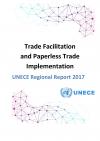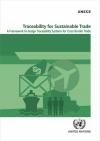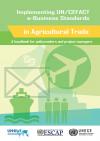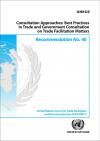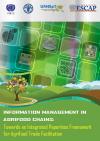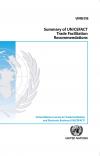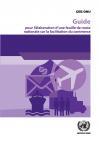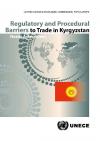Publications
Displaying Results 41 - 60 of 103
- English
As the second most polluting industry, the textile sector is responsible for a large portion of the world’s CO2 emissions and industrial waste, not to mention the exploitation of “indecent” working conditions. At the same time, the industry has a complex value chain, with production facilities located all over the world, which makes it very hard to gain accurate information about sources and
- English
Within the United Nations Economic Commission for Europe (UNECE), the United Nations Centre for Trade Facilitation and Electronic Business (UN/CEFACT) has developed a series of some 30 recommendations and standards that are used worldwide to simplify, standardize and harmonize trade procedures and information flows. Many of these are now international standards of the International
- English
Since the introduction in 1973 as the UNECE Recommendation No. 1, the UN Layout Key (UNLK) has provided Governments, organizations and the business community with a basis for a standard and aligned design of documents used in trade and transport. This has led to a major improvement in the standardization of trade documents in many countries throughout the world.Most international organizations
- English
Recommendation 42 on Trade and Transport Facilitation Monitoring Mechanisms (TTFMM) addresses issues related to institutional arrangements and methodology in designing and implementing TTFMM. It is an important contribution to UNECE’s suite of Trade Facilitation recommendations and guidance material.Download the Publication ECE/TRADE/
- English
Facilitating trade is about streamlining and simplifying international trade, particularly import and export procedures, transit requirements and procedures applied by Customs and other agencies (UNECE-UN/CEFACT). With the rapid increase of international trade, thanks in part to the reduction of tariffs and quotas, it has become evident that for countries to benefit from open global markets it
- English
A small landlocked country, the Republic of Moldova remains one of the poorest countries in South East Europe, with the economy showing continued dependence on low value-added manufacturing and agriculture along with remittances from workers abroad for income generation. The country is yet to reap the benefits of the intensive reform efforts, which have been
- English
Public-Private Partnerships (PPPs) is a possible solution for financing and implementing public projects. These projects allow the public sector to benefit from private sector funding, expertise and capacity while allowing the private sector to partner with the public sector in providing critical public services. There are a number of areas within Trade Facilitation
- English
An upper-middle income country, Albania is in the process of implementing an all-encompassing reform effort to foster national competitiveness and achieve greater integration into global value chains.Driving these reforms is the imperative for fulfilling the requirements of the European Union (EU) Acquis Communautaire, which gained new life in 2014 when Albania
- English
Consumers and producers are increasingly interested in knowing how products are made and whether there are any adverse environmental or social impacts. While two products may look or feel similar, consumers may still distinguish between them on the basis of certain intangible policy claims, such as whether they are “organic” or “sustainably produced”. Since these types of claims are difficult
- English
This Handbook presents a general framework for the design of of e-Business projects in the agrifood sector using open, international standards. It specifically looks at four e-Business standards developed by UN/CEFACT in the areas of:Electronic phytosanitary certificates; Electronic reporting of sustainable fishery management; Electronic exchange of laboratory
- English
The purpose of Recommendation N°. 40 (ECE/TRADE/423) is to inform government agencies and private sector stakeholders about approaches to effective consultations that will be flexible, transparent, fair, accountable, and participatory. This Recommendation addresses issues such as
- English
International trade in agricultural and food products is more complex than trade in manufacturing – trade regulations are stricter, paperwork is more cumbersome and logistics are more complex. These elements are mainly required for ensuring food safety for consumers. Detailed information on traded goods alongside the movement of goods in a supply chain is critically
- English
This publication (ECE/TRADE/346/Rev.1) contains the latest information on trade facilitation recommendations established under the auspices of the United Nations Centre for Trade Facilitation and Electronic Business (UN/CEFACT). The publication provides a summary of the approved
- English
This Recommendation, first published in 1974, has been revised in light of the changing context for Trade Facilitation and the adoption of the Trade Facilitation Agreement of the World Trade Organization. The revised Recommendation suggests that governments establish national trade facilitation bodies (NTFB) as an indispensable component of trade policy formation
- English
Trade facilitation creates a reliable, fast and cost-effective trade environment that benefits all countries and businesses, especially small and medium-sized enterprises (SMEs). It’s a collaborative effort by governments and traders to cut the costs of doing trade, reduce delays at borders, and make public agencies dealing with trade more efficient.Multiple
- English
In recent years, trade facilitation (TF) has been recognised as a key factor in trade and economic development policy. This is due to the realisation that trade facilitation can generate major benefits for the economy in terms of competitiveness and efficiency and can greatly enhance the participation of developing and transition economies in the global economy.
- English
The activities carried out by UN/CEFACT have very significant effects on the world we live in. They not only have specific impacts related to trade and e-business cutting across a broad range of domains, they also play a significant role in efforts to achieve even the most overarching goals such as poverty eradication and the reduction of inequality within and between
- English
Since 2010 the UNECE has been undertaking studies of regulatory and procedural barriers to trade in selected UNECE member countries with economies in transition, with a view to: assisting countries in their efforts to achieve greater regional and global economic integration; informing donors as to where assistance might be required; and, strengthening policy
- English
The continuous reductions in tariff and non-tariff barriers to trade and the rise of global supply chains have further increased the importance of trade as an engine of growth, creating new opportunities for investments, job creation and human development. However, for several countries, capitalising on these opportunities is
- English
UN/CEFACT Recommendation 34: Data Simplification and Standardization for International TradeRecommendation Number 34 (ECE/TRADE/400) was developed in response to a particular set of requests from Single Window implementers who were faced with the task of harmonizing and standardizing government information






